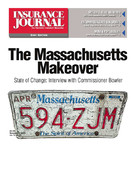By now, you probably are aware that insurance broker Marsh & McLennan Companies Inc. and Marsh Inc. (collectively Marsh) were sued in New York on Oct. 14 based on allegations of engaging in certain illegal business practices, specifically “bid rigging,” to obtain false and inflated quotes and steering business to carriers offering the most favorable commissions. The issues underlying the lawsuit have gotten attention from the regulators of many other states as well as Congress.
I have been called on extensively and quoted by the industry and business media, including U.S.A. Today, The Washington Post, CNBC and numerous insurance trade publications, to weigh in on the Marsh lawsuit and Placement Service Agreements (PSAs). Ensuring that accurate information is publicized about the business practices and complex legal issues surrounding this case should be a top priority for everyone in the industry.
IIABA agrees with New York Attorney General Eliot Spitzer that illegal activity such as bid rigging and false quotes should be prosecuted to the fullest extent of the law. Bad actors–even if there are only a few–destroy the fundamental trust brokers have with their clients and unfairly tarnish the reputation of the industry.
IIABA’s national board adopted IIABA’s Policy Regarding Broker Placement Service Agreements on Oct. 8 prior to the announcement of the Marsh lawsuit, which IIABA did not know was being filed. That policy urges brokers with PSAs to disclose the existence of those arrangements to their clients prior to the placement of insurance coverage and to conduct business in compliance with applicable state and federal law.
While the investigations and lawsuits about past activities continue, the discussion needs to move to the present and future. Unfortunately, the term contingency commission has been used interchangeably with the term PSA, but they are not one and the same. A PSA is a fee paid by a carrier to a broker for placing business with the carrier. Contingent commission is a form of incentive compensation paid after the close of the carrier’s year, and may be affected by a range of factors, such as the loss experience of business written with the carrier.
Incentive compensation is a legal and effective means of compensating sales professionals in every industry. Its use is widespread, with varying structures that account for profitability and productivity. From refrigerators to cars, and homes to business equipment, compensation that rewards a sales force for excellence is sound business practice. The compensation structure, including contingent commission, is not the real problem–the real problem is the alleged illegal activity to obtain that compensation.
IIABA feels that the push by some to use the recent developments to advocate federal regulation of insurance is simply wrong. Federal regulation is not a panacea for alleged absuses of the system. This has been borne out by scandals involving mutual funds and the savings and loan industry, both of which occurred in federally-regulated industries. The fact that the ongoing investigation was launched and conducted at the state level, not federally, proves the case that the states are capable of handling this kind of oversight.
IIABA continues to support the State Modernization and Regulatory Transparency (SMART) Act discussion draft unveiled in the U.S. House of Representatives before the fall recess. The SMART Act calls for targeted federal tools with uniform standards to reform the regulatory system, with enforcement remaining under the jurisdiction of state regulators. This can be accomplished without creating an invasive, expensive federal bureaucracy to do what the states are already positioned to do. The Big “I” believes this is the best approach and has advocated such a plan for more than three years. In fact, existing proposals for optional federal regulation would provide weaker oversight than currently exists, since companies could choose their own regulators and pit one regulator against another.
The challenges ahead for the independent agency distribution system are real, but state-based enforcement of laws against such conduct has been shown to be the most effective and IIABA continues to support that approach, with targeted federal involvement to bring about much needed uniformity.
Independent agents and brokers provide substantial and valuable services to consumers. Great care needs to be taken not to paint the entire distribution system with a broad brush because a few may have engaged in illegal and improper activities.
Bob Rusbuldt (bob.rusbuldt@iiaba.net) is CEO of the Big “I.”
Was this article valuable?
Here are more articles you may enjoy.


 Trump’s Repeal of Climate Rule Opens a ‘New Front’ for Litigation
Trump’s Repeal of Climate Rule Opens a ‘New Front’ for Litigation  Insurance Issue Leaves Some Players Off World Baseball Classic Rosters
Insurance Issue Leaves Some Players Off World Baseball Classic Rosters  Trump’s EPA Rollbacks Will Reverberate for ‘Decades’
Trump’s EPA Rollbacks Will Reverberate for ‘Decades’  A 10-Year Wait for Autonomous Vehicles to Impact Insurers, Says Fitch
A 10-Year Wait for Autonomous Vehicles to Impact Insurers, Says Fitch 


